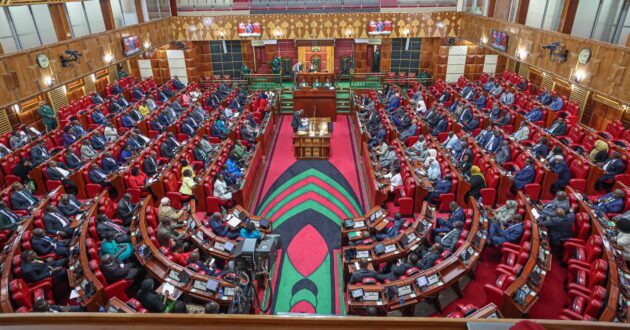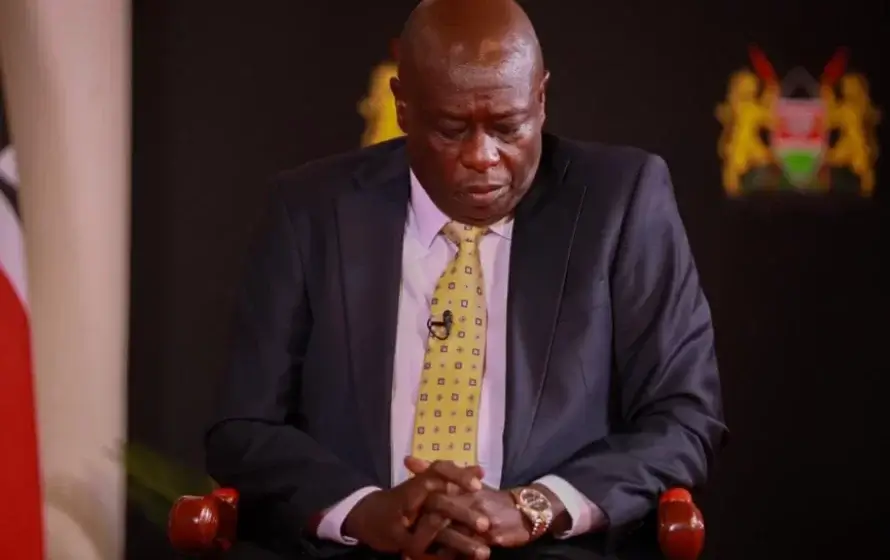|
LISTEN TO THIS THE AFRICANA VOICE ARTICLE NOW
Getting your Trinity Audio player ready...
|
Kenya’s political turmoil reached a new level on Tuesday, October 1, as the National Assembly formally began impeachment proceedings against Deputy President Rigathi Gachagua.
This unprecedented action, endorsed by 291 members of parliament, laid bare the magnitude of the fallout between Gachagua and President William Ruto, with allegations ranging from corruption and undermining government initiatives to inciting ethnic divisions and a role in deadly anti-government demonstrations.
The motion, tabled by Kibwezi West MP Mwengi Mutuse, accused Gachagua of over ten violations, including breaches of the constitution, corruption, and incitement. Mutuse, while presenting the motion, explained his impartiality. “I have no malice, no ill-will, and no personal vendetta against the Deputy President. I am simply fulfilling my duty to the people of Kenya,” he said. The motion’s acceptance by Speaker Moses Wetangula confirmed that the constitutional threshold for support had been met, setting the stage for what many see as a historic and high-stakes political exercise.
As the impeachment process moved forward, concerns about the safety of the 291 MPs who signed in support of the motion took center stage. Members of the National Assembly backing the impeachment called on Inspector General of Police Douglas Kanja to enhance their security during this critical period. National Assembly Minority Leader Junet Mohamed explained the importance of protecting MPs involved in the motion. “This is a very momentous issue,” Mohamed said, adding that Article 150 of the Constitution, which allows for the impeachment of the Deputy President, had never been exercised before in Kenya’s history.

Mohamed urged Speaker Wetangula to ensure the safety of all MPs supporting the motion, both during parliamentary sessions and at their homes. “We want those 291 members of Parliament to turn up on the day of voting without anyone missing. The Inspector General of Police, Mr. Kanja, must take responsibility to guarantee the security of these members,” Mohamed said. Dadaab MP Farah Maalim echoed these concerns, saying that the security of the president was also of paramount importance during this period. “Any reckless thug could attempt to alter the course of history, and we must ensure that our president is protected,” Maalim stated.
Majority Leader Kimani Ichung’wah also voiced strong concerns regarding security, referencing an incident on June 25 during anti-government protests in which Speaker Wetangula was allegedly targeted for elimination due to his position in the political hierarchy. “We are not dealing with an ordinary matter. These are serious concerns. There are threats circulating on social media, and we must take them seriously,” Ichung’wah said.
The impeachment process comes against the backdrop of escalating tensions between Deputy President Gachagua and President Ruto, with the deputy president facing accusations of involvement in the June protests, which turned deadly as demonstrators clashed with security forces. These protests, sparked by discontent over proposed tax hikes, highlighted the rising frustration among the public over economic policies that many viewed as burdensome. Despite the allegations, Gachagua remained defiant, denying any involvement and accusing his detractors of trying to discredit him for challenging what he described as the government’s failures.
Gachagua’s political isolation has been further worsened by the shifting alliances within the government. After the June protests, former opposition leader Raila Odinga joined forces with President Ruto, aligning his party with the ruling administration. This new partnership strengthened Ruto’s political position while leaving Gachagua increasingly marginalized. The impeachment effort, which gained traction after Odinga’s support, reflected this shifting dynamic, with the deputy president losing crucial allies.
The impeachment effort also faced numerous legal battles. Caroline Wambui Mwangi, along with several other petitioners, sought to stop the proceedings through the courts, arguing that the process was unconstitutional and procedurally flawed. Despite these attempts, judges declined to issue temporary orders, instead directing petitioners to serve the respondents in parliament and setting hearings for mid-October. Former United Democratic Alliance Secretary-General Cleophas Malala warned that the impeachment would cause Gachagua irreparable harm, effectively disqualifying him from holding future public office. However, his plea also failed to halt the proceedings.
Interior Secretary Kithure Kindiki, once a trusted ally of the deputy president, has increasingly taken on roles traditionally reserved for Gachagua. This has added to speculation that Ruto has begun distancing himself from his deputy. Kindiki, also from the Mount Kenya region, has garnered support from legislators who see him as a potential successor of Gachagua.
The Directorate of Criminal Investigations (DCI) also added to the pressure on Gachagua, recommending charges against two MPs and several close allies for allegedly planning and financing the June protests. Gachagua condemned the accusations as an “act of aggression” and an attempt to lay the groundwork for his impeachment. Meanwhile, Interior Secretary Kindiki assured parliament of his impartiality but affirmed that those involved in inciting violence would face prosecution, regardless of their political standing.
While the impeachment motion was tabled in the National Assembly, Makueni Senator Dan Maanzo filed a censure motion in the Senate against President Ruto, accusing him of failing to uphold the constitution, protect citizens from police brutality, and ensure public participation in major government initiatives. The senator cited Ruto’s handling of key policies, including the Social Health Insurance Fund and the Housing Levy, as examples of his failure to govern inclusively, arguing that the president had marginalized sections of the population and heightened tensions within the country.
Although Ruto had previously promised not to subject Gachagua to the kind of political persecution he himself faced under former President Uhuru Kenyatta, his silence on the matter has been notable. Some lawmakers have called on him to end the impeachment process, while others argued that he should stay out of it, allowing parliament to decide the fate of his deputy.











LEAVE A COMMENT
You must be logged in to post a comment.